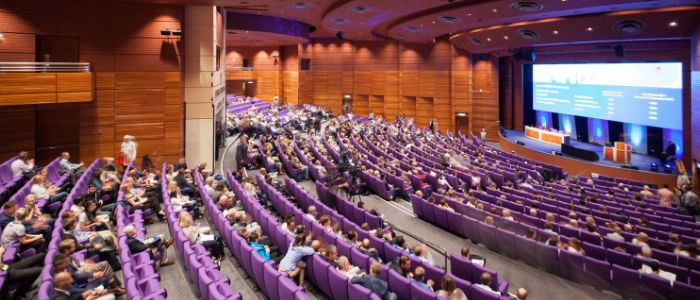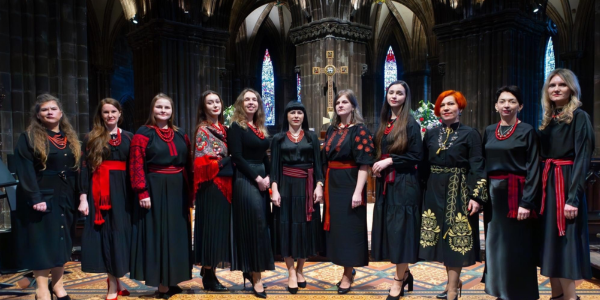
Industry colleagues from across sporting, cultural and business events reflect on how they have adapted their planning and delivery of events throughout 2021; the challenges and opportunities that arose; and the key learnings from this year they’ll take forward in the future.
Geoff Ellis, CEO of DF Concerts and TRNSMT Festival Director
Delivering TRNSMT in 2021 was nothing like we have ever organised and we were all sailing in unchartered waters. We were campaigning for support for the sector given how important the live industry is for peoples wellbeing so, when we got the go-ahead, there was elation not only for music fans but also for industry professionals who worried as to when they would work again.
We had the opportunity to bring hope and provide sunshine in what had been a dark 17 months so, we put everything we had into organising TRNSMT. The challenges we faced included implementing enhanced safety processes to keep the site COVID-19 secure, to communicating the need to take a LFT to up to 50,000 fans per day crowd. We are fortunate that we received 100% compliance on testing from all involved including festival goers, resulting in low incidences of COVID-19 cases being even potentially attributable to the event.
It is clear from this experience that partnership working is of utmost importance. We could not have made the event the success it was without the support of the Scottish Government officials, EventScotland and Glasgow City Council Officers plus the co-operation of all suppliers, artists and employees – even the weather! But most importantly, all of the fans who came out and made it one of the best festivals we have ever known by them playing their part.
Ursula McFarlane, UEFA EURO 2020 Glasgow Promotions Manager, Scottish FA
We all know how challenging it is to deliver a major event in any setting, environment and time. To be co-hosting one of the world’s largest sporting events during a global pandemic was a huge team effort for the UEFA EURO 2020 local organising structure in Glasgow.
Across three group games and one of the round of 16 clashes at the national stadium, Hampden Park, it was thrilling to welcome 40,000 fans back to international football. The official fan zone at Glasgow Green screened every match of the tournament to thousands of families and supporters in a safe environment.
With new guidance in place at Hampden Park for ticket holders, clear communications on our part was vital. Our daily communication meetings and the strong relationships across the stakeholder organisations meant that we could quickly share and update messages across our channels. We wanted every ticketholder to have a positive experience and we invested our time and efforts in helping people feel ready to enjoy this event.
Katy Koran, Artistic Director at Gilded Balloon, part of MultiStory at the Edinburgh Festival Fringe
In response to the uncertainty over what restrictions would be in place for indoor events in August, Gilded Balloon, ZOO venues, Traverse Theatre and Dancebase joined forces to establish a plan for an outdoor infrastructure that could safely accommodate socially distanced audiences and artists.
Thanks to support from the Scottish Government, City of Edinburgh Council and EventScotland to help fund outdoor events and support the safe return of live events at this year’s Edinburgh Festival Fringe the partners were able to realise their ambitious plan. Gilded Balloon and ZOO venues led on MultiStory’s overall site operations and programming, with Traverse Theatre and Dancebase as producing and programming partners. In a nearly impossible timescale, the collaborating partnership had transformed a B-list car park into a brand-new Festival hub overlooking Edinburgh Castle -MultiStory- that hosted a multi-genre programme curated by the four partners.
Planning this kind of event in the midst of so much uncertainty was challenging to say the least. I was incredibly thankful to work with such supportive partners throughout the project that provided a huge amount of support and knowledge sharing. Ensuring we had a robust COVID-19 mitigation policy was key on top of all our other policies and procedures that we had to put in place. This meant there was even more planning work to do than in previous years plus we had a fraction of the time to do it in.
Despite the challenges, the joined-up approach of the collaboration and that of the Scottish Government, City of Edinburgh Council and EventScotland meant that the event could go ahead despite the odds. One of our key take-aways from this event is that collaboration can bring new ideas and opportunities to life. This collaboration reflects the true spirit of the Edinburgh Festival Fringe, the biggest arts festival in the world and I can’t wait to see how it returns in 2022.
Jonathan Durling, Partnership Director for SweetSpot Group, Tour of Britain
Planning for the 2021 Tour of Britain was certainly full of ups and downs. It was a year of uncertainty and changes of plans but ultimately the hard work and sleepless nights made the success of the event in September even more rewarding. Unlike a stadium sport, the Tour of Britain takes place in public spaces, across hundreds of kilometres each day, is unticketed, and this year visited Scotland, Wales, and England, each with their own different take on regulations so approaches had to be adapted to meet the differing public health requirements from stage to stage.
Organising our events through the pandemic has provided opportunities and new ways of working – as an organisation we had to very quickly learn how to effectively use technology to conduct meetings and work remotely. It was great to quickly and easily get everyone, particularly our local authority and stakeholder partners from across the UK, together for a meeting particularly when conditions were changing regularly. That was also a challenge however to keep up impetus and motivation through that forum.
Overall, successfully delivering the Tour of Britain highlighted to us the importance of relationships, communication and working together with a clear focus and goals.
Symon Macintyre, Vision Mechanics Artistic Director, STORM
As the pandemic started to recede in May, planning an event remained incredibly fraught and we had to exercise extreme caution. It was slow, frustrating and no-one thought we could manage to deliver the event safely, and in August we considered giving up. However, we decided that COVID-19 was unlikely to go away and that we had to deliver and overcome the difficulties we faced.
Having received support from EventScotland via Scotland’s Year of Coasts and Waters 20/21 and Scotland’s Events Recovery Fund, this enabled STORM to be awesome and reach communities across Scotland. I have been working to produce community projects for over 30 years and I have never felt so emotionally charged as the day I listened to a pipe major playing a lament for the sea in Alloa or couched on a hill in Burghead listening to the Clavie King sing a bothy ballad about the lost fishing industry.
STORM became emblematic of the need to tackle the climate emergency and was a perfect example of how the arts can make a difference. The Scottish Government asked us if we would participate in COP26 and we agreed, also setting up our own community event in Govan. 510 million watched STORM meet Little Amal, the refugee puppet, accompanied by opera singers, choirs and dancers. We celebrated everything that is positive and hopeful about communities and people.
STORM was an amazing event and has undoubtedly affected us and our future.
Rory Colville, Championships Director, DP World Tour
Planning and delivering the 2021 Scottish Open was challenging! The most significant difference in the planning phases was the lack of certainty we had in terms of the scale of the event and any COVID-19 related restrictions that we may have had to put in place for those attending the event. Given that most facilities at golf tournaments are temporary, considerable time is required to plan and then build up these facilities. The fast-changing landscape around COVID-19 didn’t provide the time we are accustomed to, so our team had to be responsive and ready to alter plans almost up to the last minute. The European Tour group has been staging tournaments with a multitude of different restrictions and regulations in various countries over the past two years, so we are used to adapting to circumstances thrown up by the pandemic
We were pleased we were able to welcome a limited number of spectators back to a professional golf tournament in Scotland for the first time in almost two years. The 4,000 tickets on offer per day sold out quicker than ever and the overwhelming feedback from spectators was that they felt safe attending events again and had a very positive experience. It also presented our organisation and our players with the opportunity to thank front line heroes by inviting some of them to play in the Pro-Am.
Delivering golf tournaments during the pandemic has forced us to reassess how we do everything and moved us towards some technology-based solutions faster than may otherwise have been the case. We have gone digital with our Scottish Open tournament programme, developed QR code-based solutions for public catering and information sharing and created a virtual service for international media who were not able to attend. One key benefit is that all of this has helped to strengthen the tournament’s environmental credentials, in line with our wider Green Drive initiative. I think these aspects will be retained when we do return to business as usual.
Marshall Dallas, Chief Executive, Edinburgh International Conference Centre
Between February and September 2021 the EICC operated as Edinburgh’s main vaccination centre. We welcomed more than a quarter of a million people to our venue to be vaccinated – making it the most important event we’re ever likely to hold. But of course, we were delighted to welcome back our clients and delegates in September – and since then we’ve experienced a busy spell, hosting back-to-back conferences and events.
Running such a major public operation for the first eight months of the year, made transitioning back to a conference venue a smoother and more efficient process perhaps than if the building had been closed during that period. For example, we already had our COVID-19 safety measures in place, and our team had worked throughout the period, meaning they were already familiar with working to the new safety procedures, whilst managing the flow of thousands of people around the venue.
It’s the nature of our business and industry to be extremely flexible and responsive, but the challenges of the last year or so has truly shown just how quickly and efficiently our team can mobilise and respond to any given situation – which is something that I’m personally extremely proud of.
Source: EventScotland LinkedIn

![Indiana Jones and Stella: Shining a spotlight on Scotland's booming film industry VisitScotland_(600×300)[1]](https://eventsbase.co.uk/wp-content/uploads/2023/08/VisitScotland_600x3001.png)
![Sound Check: While music gets the spotlight, let's ensure business and outdoor events aren't left in the silent disco UKEVENTS_(600×300)[1]](https://eventsbase.co.uk/wp-content/uploads/2023/11/UKEVENTS_600x3001.png)

